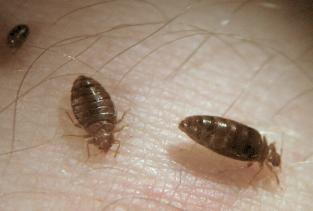Bed Bugs Found Carrying
MRSA and VRE.
A letter to the editor of Emerging Infectious Diseases, to be published in June, suggests the possibility of bedbugs being a vector for drug-resistant bacteria.
The letter reports recovery of methicillin-resistant Staphylococcus aureus (MRSA) and vancomycin-resistant Enterococcus faecium (VRE) from bedbugs in Vancouver, British Columbia. Five bedbugs were taken from each of three hospitalized patients who are residents of an impoverished community in Vancouver. The bedbugs were streaked onto standard microbiological media and bacterial colonies were identified by using conventional and automated microbiological methods. For 2 patients, VRE was isolated from 1 bedbug each. For 1 other patient, MRSA was isolated from 3 bedbugs.
It is not known whether bedbugs can directly transmit bacteria to humans during feeding. However, skin abrasion due to scratching of bites, coupled with the ability of S. aureus to infect humans through damaged skin seems a reasonable route of entry.
Recovery of MRSA and VRE from bedbugs may be due to the combination of a large infestation of bedbugs and a large percentage of people colonized with MRSA and VRE due to poor hygeine, drug use, etc. in an impoverished area such as these patients are from.
The letter concludes that further studies are needed. Bedbug carriage of MRSA does suggest a plausible potential mechanism for passive transmission of bacteria. Because of this, "Bedbugs may serve to amplify MRSA infections in impoverished urban communities."





